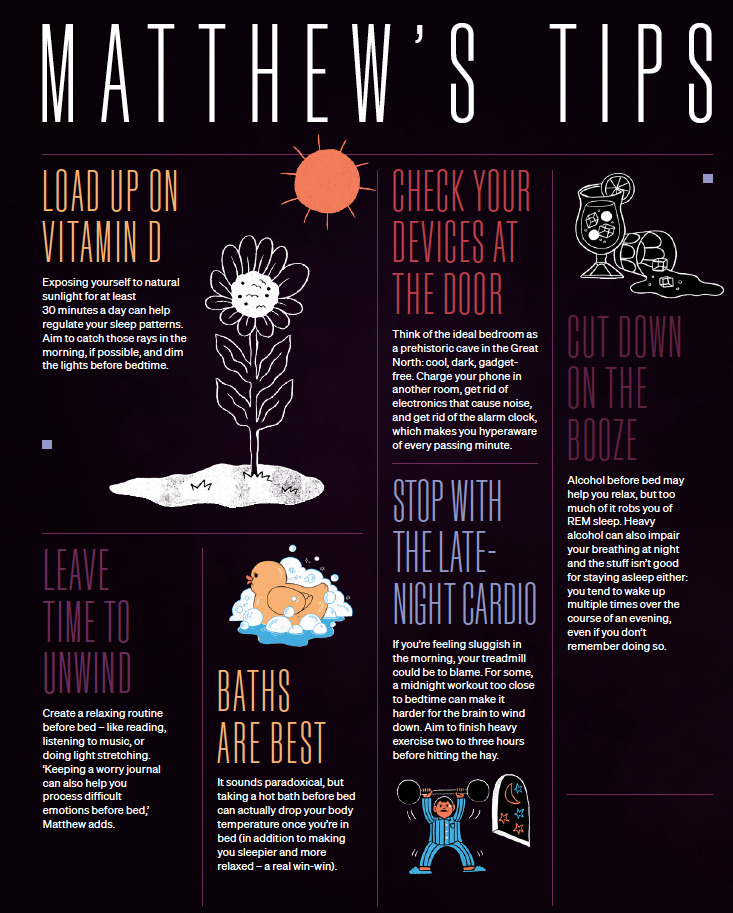While entrepreneurs focus on 12-14 hour days in the first couple of years of building a startup, an often ignored aspect of their life in early stages of the startup is sleep. While most startups are likely to fail in the first couple of months and years, the toll it takes on the health of the entrepreneurs, could be irreversible.
Sleep deprivation can result in immune disorders, cardio vascular diseases, PTSD and obesity, which could be harmful and shorten the lives of an aspiring entrepreneur. While many books have been written on various aspects of health such as nutrition, on sleep, Mathew Paul Walker, a neuroscientist and professor at UC Berkeley, and formerly at Harvard University, presents proven benefits of a good night’s sleep. It’s said the world’s renowned innovators, scientists and painters including Edison, Einstein and Dali have had their most creative ideas during sleep or power naps.
While deep sleep can boost creativity, it also has the potential to present ideas that can solve common problems entrepreneurs face in building their products or service.
“Why We Sleep” is a book by Matthew P. Walker that aims to explain the importance of sleep for our overall health and well-being. The book begins by discussing the various functions of sleep, including its role in physical repair, memory consolidation, and mood regulation.
Walker argues that sleep is essential for maintaining physical and mental health, and that chronic sleep deprivation has been linked to a range of negative health outcomes, including an increased risk of developing conditions such as obesity, diabetes, cardiovascular disease, and even Alzheimer’s disease.
The book also covers the factors that can influence the quality of sleep, such as the environment, diet, and sleep schedule. For example, Walker discusses the importance of deep sleep, or non-rapid eye movement (NREM) sleep, for physical recovery and the consolidation of memories, and the ways in which the internal “sleep drive” that determines how tired we feel is influenced by factors such as the time of day, how long we have been awake, and how much sleep we have had in the past.

In addition, the book discusses the relationship between sleep and mental health, and the ongoing research into the role of sleep in various aspects of health and well-being, such as its effects on learning and creativity, and its potential use in treating conditions such as post-traumatic stress disorder (PTSD).
Prof. Walker also covers the ways in which sleep is affected by different stages of life, such as the different sleep needs of babies, children, and teenagers due to their different stages of development, and the importance of the circadian rhythm, or body clock, in regulating sleep. The book also discusses various sleep disorders, such as insomnia, sleep apnea, and restless leg syndrome, and the treatments that are available for these conditions.
The book provides practical tips for improving sleep quality, such as establishing a regular sleep schedule, creating a sleep-friendly environment, and engaging in relaxation techniques before bedtime.
Here ar top 10 key takeaways from Why We Sleep:
Sleep is essential for maintaining physical and mental health. It helps to repair and restore the body, consolidate memories, and regulate mood. Here are top 10 keytakeaways from the book to help you improve the quality of your daily sleep:
-
- Chronic sleep deprivation has been linked to a range of negative health outcomes, including an increased risk of developing conditions such as obesity, diabetes, cardiovascular disease, and even Alzheimer’s disease.
- The quality of your sleep is just as important as the quantity. Deep sleep, or non-rapid eye movement (NREM) sleep, is particularly important for physical recovery and the consolidation of memories.
- There are several factors that can influence the quality of your sleep, including your environment, diet, and sleep schedule. Many of us are not getting enough sleep due to the demands of modern life, such as the proliferation of electronic devices and artificial light from screens of phones and computers.
- There are steps you can take to improve your sleep, such as establishing a regular sleep schedule, creating a sleep-friendly environment, and avoiding caffeine, bright light and alcohol before bed.
- The internal “sleep drive” that determines how tired you feel is influenced by a variety of factors, including the time of day, how long you have been awake, and how much sleep you have had in the past. The adenosine build up during day causes brain to arouse drowsiness, which is cleared up during the sleep.
- The quality of your sleep can be affected by various sleep disorders, such as insomnia, sleep apnea, and restless leg syndrome. These disorders can be treated with lifestyle changes, medication, or other therapies. There is a close connection between sleep and mental health. Poor sleep can exacerbate mental health problems, while good sleep can help to improve mental health.
- There is ongoing research into the role of sleep in various aspects of health and well-being, including its effects on learning and creativity, and its potential use in treating conditions such as post-traumatic stress disorder (PTSD). The circadian rhythm, or body clock, plays a crucial role in regulating sleep. It is influenced by various internal and external cues, such as light and temperature, and can be disrupted by shift work, jet lag, and other factors. Short naps do increase health, however longer naps can disrupt normal deep sleep patterns.
- There are several ways to improve your sleep hygiene, or the habits and practices that can promote healthy sleep. These include establishing a regular sleep schedule, creating a comfortable sleep environment, and engaging in relaxation techniques before bedtime.












